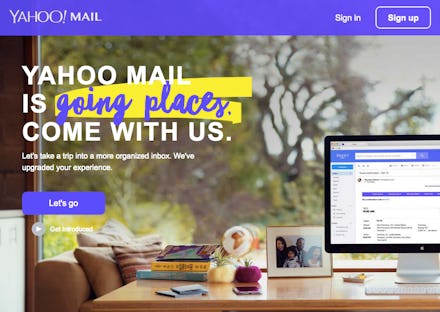Yahoo wants to read your emails to target ads to you. Here’s how to stop them.

Yahoo might start reading through users’ emails to find ways to better serve them ads.
According to a recent report from the Wall Street Journal, Yahoo parent company Oath is in the midst of pitching to advertisers a service that would analyze the contents of emails belonging to Yahoo’s 200 million email users. According to Doug Sharp, Oath’s vice president of data, measurements and insights, users would be served ads based on the commercial messages in their inbox: emails from retailers, mass mailings and more. The service would look for these types of emails to get a sense of a person’s preferences. The service would also extend to inboxes belonging to AOL, another Oath company.
According to the company, users shouldn’t be surprised that email providers would glance over private messages. “Email is an expensive system,” Sharp told the Wall Street Journal. “I think it’s reasonable and ethical to expect the value exchange, if you’ve got this mail service and there is advertising going on.” WSJ noted that users who pay monthly for the ad-free Yahoo Mail experience would also have their emails scanned.
Here’s how to halt Yahoo from using your data for ads
Users of both the free and paid versions of Yahoo Mail can opt out of ad tracking through Yahoo’s Ad Interest Manager. In the “Your Advertising Choices” section, you’ll be able to opt out of Yahoo’s tracking. You’ll have to hit two opt-out buttons: one under both the “across the web” and “on Yahoo” sections.
As we saw with Google, however, opting out of one setting could still leave you vulnerable elsewhere. It’s unclear, if Oath’s advertising plans go into effect, if users will need to change a new setting option to remain opted out.
Yahoo isn’t the first to scan user emails to figure out what to sell you. When Gmail was announced in 2004, it made waves as one of the first major email services to scan users’ emails.
“This is one of the hottest issues we’ve ever dealt with in terms of internet issues,” Simon Davies, the director of the anti-surveillance group Privacy International, once told PC World.
In June 2017, the company announced it would no longer scan users’ emails. “Google already collects so much data from its search engine that it no longer needed to rely on email data,” Andreas Reiffen, a chief executive at Crealytics GmbH, told WSJ.
As for Microsoft’s email services, is more unclear about whether or not it scans your inbox. Microsoft has said no, even though their inbox was caught sending identifiable information to Microsoft. Smaller email companies like ProtonMail use encryption so the only parties who can read an email is the sender and the recipient. The simplest way to ensure a mail service isn’t snooping on your personal messages is to opt for an encrypted service; as ProtonMail CEO Andy Yen told Mic in an earlier interview, anything that’s stored with encryption “we can’t access without your permission.”